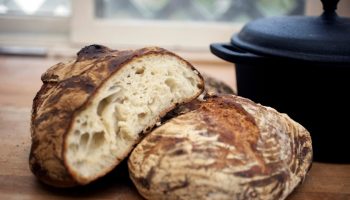Water:
A California study of 240 women found that dieters who replaced their sweetened drinks with water lost an average of 3 pounds more a year than those who didn’t. Subjects who sipped more than 4 cups of water a day lost 2 additional pounds, compared with those who drank less. Plus, the phosphoric acid in soda may contribute to bone loss—and osteoporosis—by changing the acid balance in your blood.
High-fiber granola bars:
A small British study found that women who eat a fiber-rich, high-carb breakfast burn twice as much fat during workouts later in the day as those who eat more refined (lower-fiber) foods. Refined carbs spike your insulin levels, which limits your body’s ability to use fat as fuel, explains Lisa Dorfman, RD, adjunct professor at the University of Miami.
Ground flaxseed:
Flaxseed is rich in fiber and healthy fats, which help stabilize blood sugar, so you’re less likely to binge. Some research suggests flax can also help soothe symptoms of hormone swings because it’s high in plant estrogens.
Choose ground flaxseed, as it’s easier to digest. Sprinkle it over cereals, soups, or salads, or add it to smoothies.
Walnuts:
Instead of snacking on some chips, open up a bag of nuts: Walnuts are rich in omega-3 fatty acids, which may keep you feeling fuller longer.
In a 1-year study of people with diabetes who were following a low-fat diet, Australian researchers discovered that those who included 8 to 10 walnuts a day lost more weight and body fat.
Hot sauce:
Forget bland condiments: if you want to burn fat, spice things up.
In a study of 36 men and women, Australian researchers found that following a spicy meal, levels of insulin—the hormone that triggers body fat storage—were lowered by as much as 32%. One theory: capsaicin, the chemical that gives chiles their fire, may improve the body’s ability to clear insulin from the bloodstream after you eat, so you’re more likely to burn fat following a meal spiked with chile peppers than after one that isn’t packing heat.
Cinnamon:
Sweeten your oatmeal or frothy coffee drinks with this sweet spice instead of sugar (which has 16 calories per teaspoon) and you can save a couple hundred calories a week, enough to shed 2 to 3 pounds in a year without doing anything else.
You’ll also be doing your heart a favor as protective estrogen levels decline: Pakistani researchers found that 1/2 teaspoon of cinnamon a day could lower heart-damaging cholesterol by 18% and triglycerides by 30%.
Salmon:
Just 3 ounces of canned salmon delivers 530 IU (more than the Daily Value) for vitamin D and 181 mg of calcium, a power-packed nutritional combination that may be just what your waistline needs as you get older.
In a 7-year study of more than 36,000 women ages 50 to 79, researchers at Kaiser Permanente found that those who took both calcium and vitamin D supplements gained less weight after menopause than those who took a placebo.
Romaine lettuce:
Filling up with a leafy green can trim the overall number of calories you eat by 10%; 2 cups of romaine rack up half your daily fill of vitamin A, plus 113% of bone-building vitamin K.
Bonus: leafy green vegetables can protect against lung cancer. Adults who ate at least one portion per day were half as likely to develop lung cancer as people who’d eaten them fewer than five times per week, according to a Spanish study
Grapefruit:
When volunteers ate half a grapefruit before every meal in a University of Arizona study, they shaved an inch off their waists, thanks to naringenin, which experts say may help burn fat.
Grapefruit is also a terrific source of vitamins A and B5, potassium, folate, and fiber, as well as cancer-fiighting lycopene.
Edamame:
Packed with an intelligent combo of protein, and healthy fat, this soy snack is guaranteed to keep you full and satisfied for hours. In just a half-cup serving, you get as much fiber as you would if you ate four slices of whole-wheat bread, says Elaine Magee, MPH, RD, a nutrition writer for WebMD.
Soy boasts its own benefits, too. A study from the Chinese University of Hong Kong finds the isoflavones in soy protein can reduce LDL “bad” cholesterol, and raise HDL “good” cholesterol. Isoflavones have also been shown to fight against cancer, heart disease and osteoporosis.
Dark chocolate chips:
These flavor bombs put the brakes on a craving. The little pieces fool you into thinking you’re getting more, helping you eat less, finds new research.
As if that weren’t enough, dark chocolate is brimming with healthy monounsaturated fatty acids, has fewer carbs, sugar and more iron and fiber than it’s milkier counterpart. Not that you needed an excuse to indulge. Just remember to buy brands with high cacao percentages (70% or more) to cut down on sugar.




